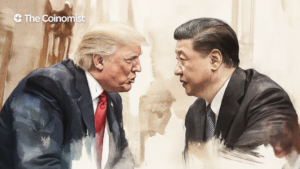
With tariff pressure mounting between the U.S. and China, the crypto market senses opportunity. Bitcoin, once again, is emerging as a possible refuge from geopolitical shocks.

Beyond charts and profit margins, сrypto trading affects how we connect with others. And the damage is often harder to measure than portfolio losses.

What’s it like to live a crypto lifestyle in France? In Paris, digital nomads are testing the boundaries of freedom, finance, and the future of tech in one of Europe’s most iconic cities.

The Georgian capital is quietly building its rep as a sanctuary for digital nomads. From zero capital gains taxes to buzzing Web3 cafes, the crypto lifestyle of Tbilisi hits different.

How are UAE tech firms optimizing financial operations through crypto-compatible banking, OTC settlements, and stablecoin flows? We examine strategic models shaping crypto banking Dubai.

With tariff pressure mounting between the U.S. and China, the crypto market senses opportunity. Bitcoin, once again, is emerging as a possible refuge from geopolitical shocks.

American Bitcoin, a new project led by Hut 8 and Eric Trump, aims to bring Bitcoin mining home. But with Trump-era tariffs looming, can ideology and infrastructure outpace geopolitical risk?

Trump’s new tariffs may target trade—but crypto could be the collateral damage. PitchBook’s analysis reveals how Bitcoin, stablecoins, and mining face new risks in a shifting global economy.

Explore the concept of a Black Swan event—a rare, unpredictable occurrence with massive impact. Learn how these events affect crypto markets and what they mean for investors.

Explore the key differences between fiat money and commodity money. Learn about their intrinsic value, historical context, advantages, disadvantages, and real-world examples.

In recent years, blockchain technology has gained immense popularity, being the backbone of cryptocurrencies, decentralized finance (DeFi), and various other applications. However, as the technology continues to evolve, a crucial problem has surfaced: the blockchain trilemma.

BlackRock CEO Larry Fink, once a proud Bitcoin skeptic, now warns the U.S. dollar could lose its global edge to digital assets like BTC.

“We're using the blockchain. We're using bitcoin. We are going to use digital assets to pound forward.” These were the words of U.S. Secretary of Commerce Howard Lutnick at the country's first crypto summit.

Dreaming of building your crypto business? Here’s how to start a crypto business in Dubai and launch legally with confidence.

Today, crypto lawyer James Murphy, known as MetaLawMan on X, announced that he is suing the U.S. government over documents related to Satoshi Nakamoto’s identity.

Inside the Hyperliquid surge: from low-profile beginnings to billion-dollar trades—and the quiet fight for control over on-chain derivatives.

A spring cleaning turned into a costly crypto accident when a woman unknowingly threw away a USB drive holding £3 million in Bitcoin.

The crypto market crash, triggered by U.S. tariffs and major liquidations, is a hot topic on X/Twitter today.

Bitcoin bounced 2.44% following a flash crash and now consolidates near $80,000. Volatility remains elevated due to U.S. tariff policy and ETF outflows.

An overview of BTC, ETH, XAUT, and S&P500 charts, and the current cryptocurrency market dynamics.

An overview of BTC, ETH, XAUT, and S&P500 charts, and the current cryptocurrency market dynamics.

Matvii Diadkov, founder of Bitmedia, shared with us in an exclusive interview his expert insights on Web3 adoption, impact of GameFi and community-centering tendencies in the market.

The first crypto craze took place almost a decade ago. Overnight, many people found out about Bitcoin and its underlying technology, blockchain.

Volodymyr Nosov, CEO of Europe’s largest crypto exchange WhiteBIT, sat down with Dmytro Gordon, one of Ukraine’s most prominent journalists. The interview touched on Bitcoin, crypto, WhiteBIT, cars, keys to success, and business vision.

Explore the concept of a Black Swan event—a rare, unpredictable occurrence with massive impact. Learn how these events affect crypto markets and what they mean for investors.

Money20/20 Asia 2025, a leading fintech gathering in the region, returns this April with a focus on the future of finance, innovation, and human-centered tech.

Are sky-high Ethereum fees getting you down? The folks at Zora have come up with an alternative, introducing their Layer 2 solution with lower transaction fees. This article will walk you through how to get involved with the project and earn some rewards.